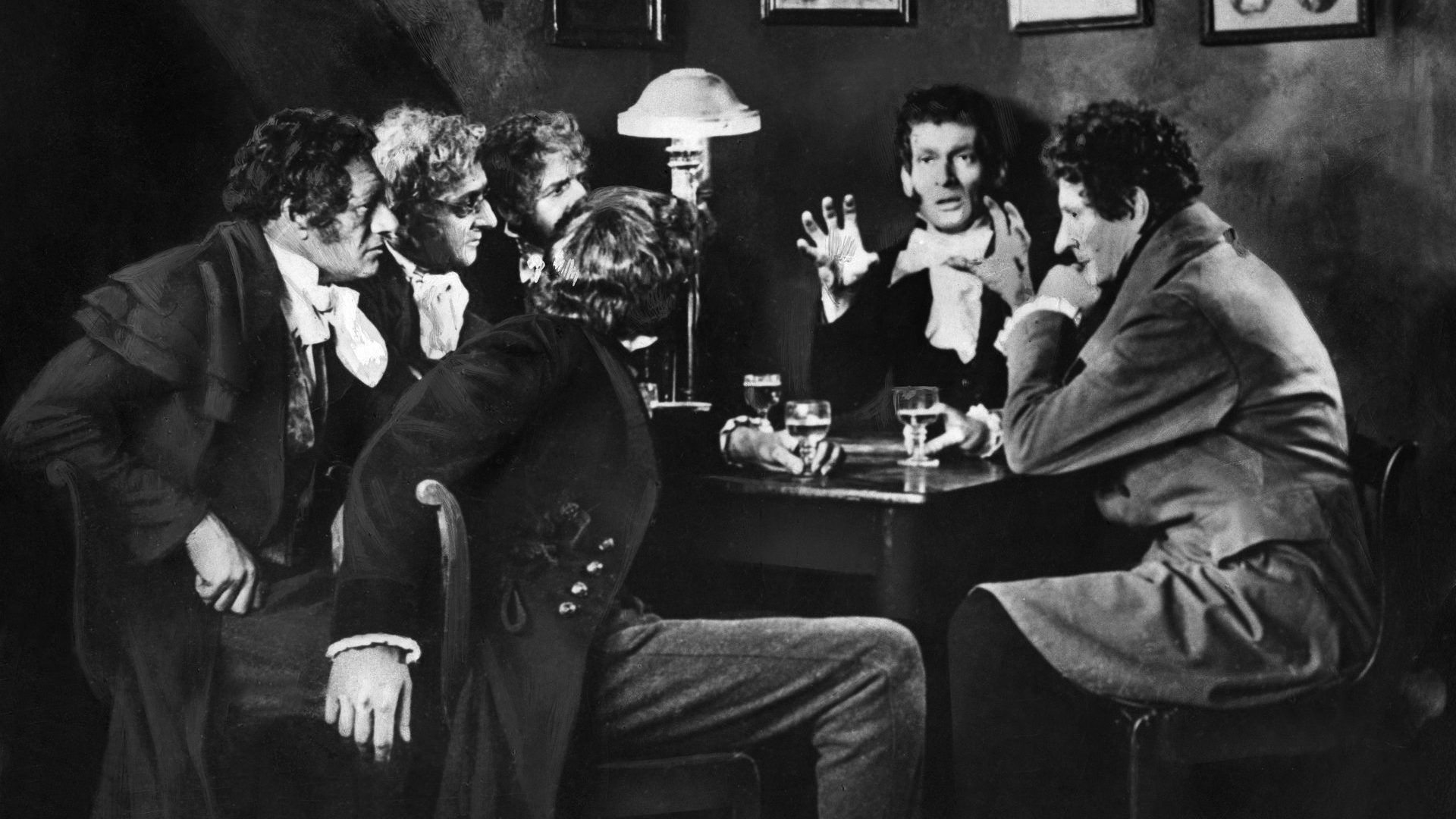There are three possible ways to sum up the life of ETA Hoffmann, who died
200 years ago this week on June 25 1822. He was an unassuming career civil servant in a Prussian bureaucracy beleaguered by the expansionist policies of Napoleon Bonaparte. Alternatively, he was a hobbyist writer, composer and artist who produced a few notable works that received minor appreciation during his lifetime, but nothing to really make people sit up and take notice.
Both descriptions are apt, indeed they are likely to have been the recollections of his contemporaries. Neither do him justice, but then history itself hasn’t really done justice to ETA Hoffmann. Maybe, 200 years after his death, it’s time to change that.
There is a third way to sum up ETA Hoffmann. That description encompasses a man who was the driving force behind European Romanticism, who broke new ground in writing horror fiction and fantasy
as well as essentially inventing the detective story. There was also the small matter of being the first to bring philosophy into the appreciation of music and in effect devising the entire canon of modern music criticism. Hoffmann’s quiet influence spread from the 19th century into the 20th and beyond, inspiring a range of creative people from Schumann to Tarkovsky, Poe to Kafka, Dickens to Hitchcock, Tchaikovsky to Baudelaire.
All that and a day job, too.
Few people can claim to have changed the world with a music review, but in 1810 Hoffmann did just that. Writing about Beethoven’s Fifth Symphony – which he hadn’t even heard performed, just read the score – in the Allgemeine musikalische Zeitung, he became the first to assert that music occupies “a separate realm beyond the phenomenal” providing the listener with “a glimpse of the infinite”. Nobody had applied this kind of deep-thinking approach to music before, writing about it in a philosophical context rather than deconstructing classical form and picking apart techniques. Hoffmann even showed his workings, detecting a “teleological progression from the childlike innocence of Haydn to the superhuman Mozart to the divine Beethoven”.
“Listening to Beethoven,” he wrote, “we become aware of a higher form of
reality not otherwise perceptible to us… Beethoven’s music moves the lever controlling horror, fear, dread and pain, and awakens that infinite longing that is the essence of Romanticism.”
This was groundbreaking stuff, and to this day is cited as the birth of modern music criticism as well as in effect a manifesto for Romanticism in the arts. Hoffmann felt music was the highest art form of them all and instrumental music its purest expression. He was a composer of some experience himself – the “A” in his name stands for Amadeus, added in tribute to Mozart – whose operas were performed in his lifetime, but the realisation of his own limitations, when compared with the likes of Beethoven, saw him eventually give up composition in favour of writing.
Despite not taking up the pen creatively until his mid-30s, Hoffmann managed to carve out a remarkable literary legacy. His tales of the weird and macabre kickstarted a surge in Gothic fiction. His 1819 novella Mademoiselle de Scuderi, in which a woman goes in search of a murderer targeting men delivering jewellery to their sweethearts in 17th-century Paris, is a detective story published more than two decades before The Murders in the Rue Morgue by Edgar Allan Poe, widely credited with being the first modern whodunnit.
His 1816 story The Nutcracker and the Mouse King was adapted by Tchaikovsky as the ballet The Nutcracker, Léo Delibes took aspects of that story combined with another eerie Hoffmann tale The Sandman to create the ballet Coppélia and the source texts behind Offenbach’s opera The Tales of Hoffmann are self-explanatory. But the writer’s most ardent devotee was Robert Schumann.
“One hardly dares breathe when one reads Hoffmann,” Schumann wrote, and credited the writer with being at the very heart of his music. Fantasiestücke and Nachtstücke were inspired by Hoffmann’s stories, while
his piano suite Kreisleriana was inspired by one of Hoffmann’s best creations, the moody, self-absorbed composer Johannes Kreisler who appears in three novels and acts in effect as the author’s alter-ego.
One theme running through Hoffmann’s horror stories is that of the split personality: characters who are regular citizens by day but by night adopt a different persona, a thief or a murderer, say (it’s possible Robert Louis Stevenson was harking back to his readings of Hoffmann when he
created Dr Jekyll and Mr Hyde). In a sense this schism represented Hoffmann himself, working in mundane clerical jobs by day while pursuing artistic endeavours that would resonate down the centuries, embarking on flights of artistic fancy to escape the cage of bureaucracy. This would have resonated with Schumann, too, a man forced by parental pressure to embark on lengthy legal studies, pushing the music that coursed through him into the background.
Like Schumann, there were many factors in Hoffmann’s background that
forged the deep-thinking personality whose inner life was compartmentalised by early family trauma and the often grisly reality of Europe during the Napoleonic wars.
He had grown up in Königsberg, now the Russian exclave of Kaliningrad, where after his parents’ separation he lived with his mother while his brother remained with their father, an early indicator of the divisions and double lives that would pepper his later work.
Having studied law in his home city, in 1798 at the age of 22 Hoffmann moved to Berlin to take up a position as clerk of the court at the court of
appeal. His time in a city thrumming with artistic creativity was short, promotions sending him into southern Prussia and a posting in Posen, modern Poznań. He was in trouble almost as soon as he arrived, when
caricatures he had drawn of local officials were circulated at the Shrove
Tuesday carnival, to widespread merriment. The lampooned officials were predictably less tickled and complaints were sent to Berlin. The young legal official was transferred to Płock, in eastern Poland, even further into what Hoffmann would have seen as a cultural desert.
Being so near yet so far from some of the most exciting cultural developments in modern European history was frustrating for Hoffmann,
not least when in 1803 he entered a play called Der Preis, The Prize, into a
local magazine competition, a play about entering a play into a local magazine competition. Not only did he not win, the magazine announced that the standard had been so poor that nobody won.
A move to Warsaw brought greater cultural rewards, but when Napoleon’s forces took the city in 1806 one of their first acts was to dismantle its Prussian bureaucracy. Hoffmann was on the move again, returning first to Berlin, then to Bamberg, where he took up a post as a theatre manager and began writing for the influential Allgemeine musikalische Zeitung. It was there in 1809 that Hoffmann published his first work of fiction, Ritter Gluck, a tale of a man convinced he was meeting the composer Gluck 20 years after Gluck’s death.
Dresden was his next move, after accepting a post as director of an opera company, only to arrive and find the city in uproar, with invading French forces and the company gone to Leipzig. Eventually, he was able to follow them, but with bridges destroyed and fighting all around the city, this was a tricky operation. The coach in which he travelled then overturned, killing one of the passengers. A ceasefire allowed a return to Dresden, only for intense fighting to break out in what turned into the Battle of Dresden. Hoffmann witnessed terrible things, people killed in front of him by stray artillery, the blood and gore of the battlefield he visited in the immediate aftermath of the fighting. The trauma of what he had seen clearly inhabits the horror stories he wrote in his later years.
In 1814 he returned to the legal profession in Berlin, where he spent his last years writing, locked in legal wranglings and in declining health. The memories of what he had seen in and around Dresden possibly contributed to an increasing dependence on alcohol which, combined with syphilis, led to Hoffmann’s death at the age of 46.
He’s not really a household name these days, but European culture owes
a great deal to ETA Hoffmann. What better time than the bicentenary of his
death to appreciate his contribution? After all, as the man himself said in his
1819 novella Signor Formica, “Everything here below beneath the sun is subject to continual change; and perhaps there is nothing which can be called more inconstant than opinion, which turns round in an everlasting circle like the wheel of fortune.
“He who reaps praise today is overwhelmed with biting censure tomorrow; today we trample underfoot the man who tomorrow will be raised far above us.”




